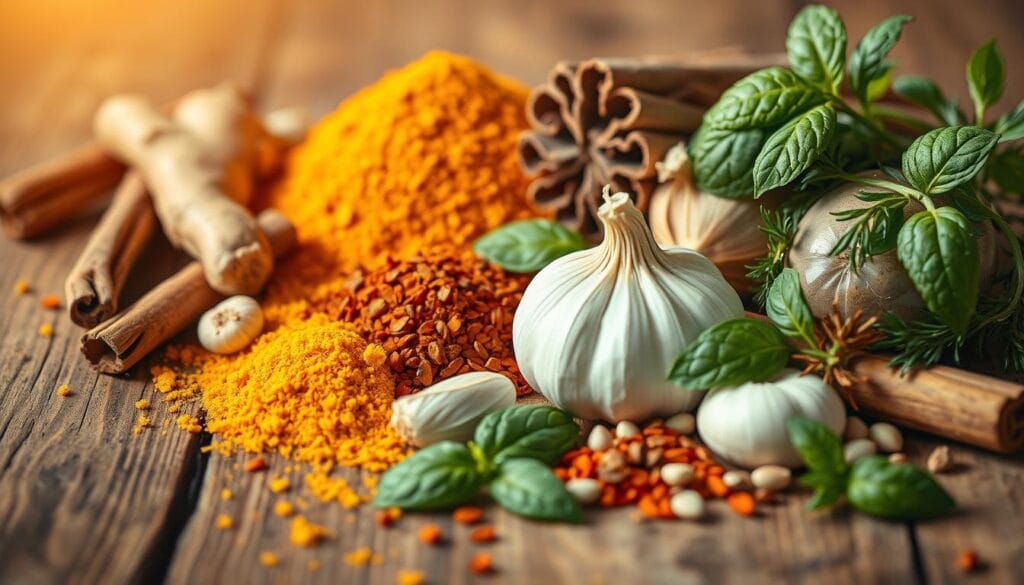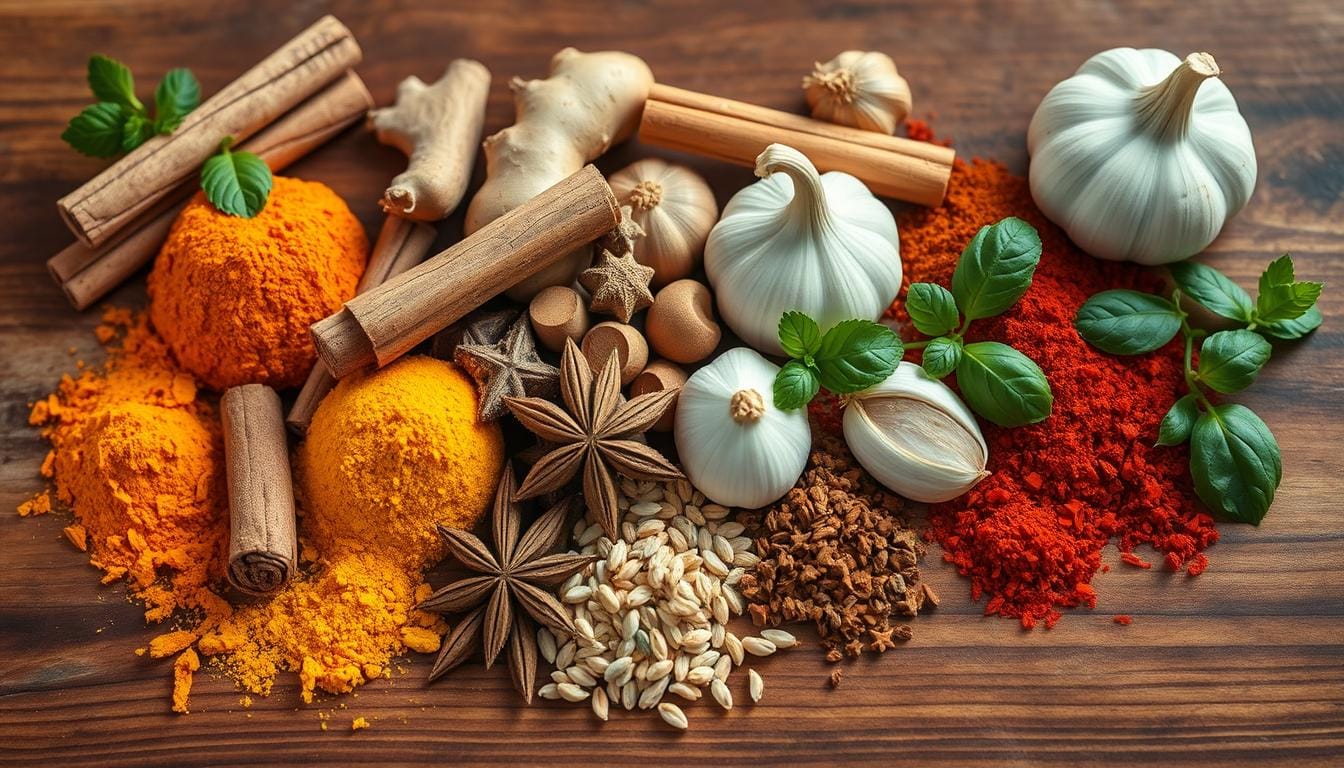Heart-Healthy Spices
Can certain spices really help improve heart health? If so, what spices should we be adding to our diet? The path to a healthier heart is delicious, and it starts with knowing the heart-healthy benefits of spices .
We’ll explore natural and delicious ways to boost your heart health. We’ll look at the science behind these spices, how they can be part of your daily meals, and highlight spices that help improve heart health.
By discovering the different heart-healthy spices and their health benefits, we can make better choices when it comes to food. This leads to a healthier heart and a happier life, all thanks to heart-healthy spices .
Table of Contents
Introduction to Heart-Healthy Spices
Key points
- Heart-healthy spices can help improve cardiovascular health.
- Some spices have natural health benefits that can boost heart health.
- Incorporating heart-healthy spices into your diet can be easy and delicious.
- Understanding the science behind heart-healthy spices is key to making informed decisions.
- Spices can be a natural and delicious way to improve overall health.
- Heart-healthy spices can contribute to a healthier heart and a happier life.
Introduction to Spices and Heart Health
Diet is key to heart health. Adding spices to your meals can boost your heart health. Heart health is essential to feeling good overall.
Eating well is important for your heart health. Spices can help improve your diet and help your heart. Learning about the benefits of spices is a step toward a healthier life.
Understanding Heart Health
Heart health means that your heart and blood vessels are in good condition. A healthy heart pumps blood well, giving your body what it needs. Spices can help keep your heart strong and lower your risk of heart disease.
The role of diet in cardiovascular health
What you eat affects your heart health. Eating fruits, vegetables, whole grains, and lean proteins is good for your heart. Adding spices like turmeric and cinnamon can make your diet even better for your heart.
Knowing about heart health and diet can help you make better choices. Adding spices to your daily meals can bring many heart health benefits.
Benefits of spices for cardiovascular health
Keeping your heart healthy is crucial. Adding the best spices to your diet can help keep your heart healthy. Cardiologist-approved spices are known to fight inflammation and oxidative stress.
A healthy heart is the key to happiness. Certain spices can help keep your heart healthy. Knowing the benefits of these spices can help you make food choices and your lifestyle.
Antioxidant properties of spices
Spices like turmeric and cinnamon are rich in antioxidants. They protect the heart from damage. Adding them to your food is a delicious way to support your heart health.
Anti-inflammatory effects
Many cardiology-approved spices also fight inflammation. This can lower the risk of heart disease. Using these spices in your meals is a smart way to keep your heart healthy.
Here are some main benefits of top spices for heart health:
- Reducing inflammation and oxidative stress
- Improving blood flow and circulation
- Supporting overall cardiovascular health
Popular Spices for Heart Health
Certain spices are great for heart health. They add flavor and nutrition to your meals. Adding these spices to your diet can help protect your heart.
Turmeric, cinnamon, and garlic are top choices for heart health. Turmeric has curcumin, which fights inflammation. Cinnamon helps control blood sugar and cholesterol.
Turmeric: The Golden Spice
Turmeric has been used for centuries. Its curcumin is studied for health benefits. It reduces inflammation and improves heart health.
Cinnamon: Sweet Benefits
Cinnamon is good for the heart. It’s sweet and goes well in many dishes. It helps lower blood sugar and improve cholesterol.
Garlic: A Flavorful Heart Protector
Garlic is great for heart health. It has antioxidants and anti-inflammatory effects. Adding garlic to your meals can support your heart.
How Spices Affect Cholesterol Levels
Spices can greatly impact cholesterol levels, which is key for heart health. Turmeric and cinnamon, for example, have oils that lower cholesterol. Adding these spices to your meals can help keep your heart healthy.
The link between spices and cholesterol is complex. But research shows how spices can lower cholesterol. Some spices block cholesterol absorption in the gut. Others help remove bile acids, which also lowers cholesterol.
The Role of Essential Oils in Spices
Essential oils in spices for heart health are vital for their cholesterol benefits. These oils fight inflammation and protect against heart disease.
Studies Supporting Cholesterol Reduction
Studies show spices can really help lower cholesterol. Turmeric, for instance, was found to cut bad cholesterol and boost good cholesterol. Cinnamon also showed promise, reducing bad cholesterol and triglycerides.
Adding spices for heart health to your meals is easy and beneficial. Their heart-healthy benefits make them a great choice for a healthy diet.
Spices with Blood Pressure Benefits
Adding spices to your meals can greatly improve heart health. High blood pressure is a major risk for heart disease. Certain spices, like pepper and cardamom, have compounds that help keep blood pressure in check.
Diet is key in managing blood pressure. Adding heart-healthy spices to your meals is a simple way to support healthy blood pressure. Some of the best spices for heart health include:
- Pepper, which has been shown to have a positive impact on blood pressure
- Cardamom, which has been found to have antioxidant and anti-inflammatory properties
By adding these spices to your meals, you can help keep your blood pressure healthy. This is a great step towards a healthier heart and a lower risk of heart disease.
The Impact of Pepper on Blood Pressure
Pepper’s natural compounds can relax blood vessels and improve blood flow. This can help lower blood pressure.
Investigating Cardamom’s Effects
Cardamom has antioxidants and anti-inflammatory properties. These can help support healthy blood pressure. Adding cardamom to your diet can reduce heart disease risk and support heart health.
| Spice | Benefits |
|---|---|
| Pepper | Lowes blood pressure, improves blood flow |
| Cardamom | Antioxidant and anti-inflammatory properties, supports healthy blood pressure |
Adding Spices to Your Diet
Adding heart-healthy spices to your meals is easy and tasty. Start with a few spices like turmeric or cinnamon. Then, mix different spices to find your favorite flavors.
Want to boost your heart health? Here are some tips:
- Start with small amounts: Add a pinch of your chosen spice to a meal and adjust to taste.
- Experiment with blends: Combine different heart-healthy spices to create unique and delicious flavors.
- Incorporate into daily routines: Add spices to your morning oatmeal, soups, or salads for an extra boost of flavor and nutrition.
Some great spice blends for heart health include:
| Spice Blend | Ingredients | Benefits |
|---|---|---|
| Curry Powder | Turmeric, coriander, cumin | Anti-inflammatory, antioxidant properties |
| Herbs de Provence | Thyme, rosemary, oregano | Antioxidant, anti-inflammatory effects |

Adding these heart-healthy spices to your diet can greatly improve your heart health. Always talk to a doctor before changing your diet or adding new supplements.
Cooking Tips for Heart-Healthy Meals
Cooking for heart health doesn’t mean you have to give up flavor. The right spices can make your meals both tasty and good for your heart. Spices offer many benefits for heart health, making your dishes both flavorful and nutritious.
Reducing Sodium with Flavorful Spices
One way to make heart-healthy meals is to cut down on sodium. Spices can add flavor without salt. Here are some spices that help reduce sodium:
- Turmeric, which adds a warm, earthy flavor
- Paprika, which adds a smoky, slightly sweet flavor
- Ginger, which adds a spicy, warming flavor
Pairing Spices with Nutrient-Dense Foods
Pairing spices with nutrient-rich foods is another great way to cook heart-healthy meals. For instance, cinnamon with oatmeal or cumin with black beans makes for tasty, nutritious dishes. Spices work best with whole, nutrient-dense foods to boost heart health benefits.
Herbal Teas and Their Heart Benefits
Herbal teas are a natural way to support heart health. They are great for a heart-healthy diet. These teas can be calming or refreshing, offering a tasty way to enjoy heart-protective herbs.
Some herbal teas can help your heart health. They are easy to add to your daily routine. For instance, peppermint tea can calm your body, reducing stress. Hibiscus tea can also help lower blood pressure.
Peppermint and Heart Health
Peppermint tea is known for its health benefits, including heart health. It calms the body, reducing stress and anxiety. It also has anti-inflammatory properties.
Hibiscus Tea: A Natural Remedy
Hibiscus tea is good for your heart too. It can lower blood pressure and has anti-inflammatory effects. It’s also full of antioxidants, protecting against heart disease.
Herbal teas like peppermint and hibiscus are great for a heart-healthy diet. They support heart wellness and lower heart disease risk. Adding these teas to your daily routine is a healthy choice.
| Herbal Tea | Heart Health Benefits |
|---|---|
| Peppermint Tea | Calming effect, anti-inflammatory properties |
| Hibiscus Tea | Positive effect on blood pressure, anti-inflammatory properties, rich in antioxidants |
Safety and Considerations with Spices
Adding cardiology-approved spices to your diet is great for heart health. But, it’s important to watch out for allergies and sensitivities. Some people might have bad reactions to certain spices. Always be careful and know the risks.
It’s key to use spices in moderation. Spices like turmeric and cinnamon can be strong. They might affect your medications or health conditions. Always talk to a doctor before trying new spices.
Allergies and Sensitivities
Spices like garlic, ginger, and chili peppers can cause allergies. If you get hives, itch, or have trouble breathing, get help fast. Some people might also react to spice blends, leading to stomach problems or other issues.
Consulting Healthcare Professionals
For safe spice use, talk to a doctor or dietitian. They can give you advice on the best spices for your heart. They’ll help make a plan that fits your health needs.
Being careful about allergies and talking to doctors is important. This way, you can enjoy the benefits of spices while staying safe. Always put your health first when trying new spices.
| Spice | Potential Benefits | Potential Risks |
|---|---|---|
| Turmeric | Anti-inflammatory effects, antioxidant properties | Interaction with blood thinners, stomach upset |
| Cinnamon | Lowering blood sugar levels, improving insulin sensitivity | Interaction with diabetes medications, allergic reactions |
Research and Studies on Spices and Heart Health
Recent studies have shown the benefits of spices for heart health. They highlight the need to add heart-healthy spices to our diets. The complex relationship between spices and heart health involves various compounds that offer benefits.
Studies have found that some spices have antioxidant and anti-inflammatory properties. These can lower the risk of heart disease. For instance, turmeric contains curcumin, a strong antioxidant with anti-inflammatory effects.
Key Findings from Recent Studies
- The antioxidant properties of spices can reduce body stress and inflammation.
- The anti-inflammatory effects of spices may reduce the risk of heart disease.
- Some spices, such as cinnamon and garlic, can help lower blood pressure.
Historical use of spices in medicine
Spices have been used in traditional medicine for centuries to promote health and well-being. Spices such as ginger and cayenne pepper have been used to treat digestive problems and pain.
| Spices | Traditional use | Modern health benefits |
|---|---|---|
| turmeric | Treatment of arthritis and digestive problems | Reduce inflammation and improve heart health |
| ginger | Treatment of nausea and digestive problems | Reduce inflammation and improve cardiovascular health |
| Cinnamon | Treatment of respiratory problems | Lower blood sugar levels and improve heart health |
Heart-healthy spice recipe
Let’s explore a delicious and healthy recipe that promotes heart health with spices. Spices can add flavor and nutrients to our meals. This seasoned quinoa salad is a perfect way to use heart-healthy spices in your cooking.
Spicy Quinoa Salad Recipe
This recipe combines quinoa, mixed greens, and heart-healthy spices. Turmeric, cinnamon, and garlic are the key spices. They’re packed with antioxidants and anti-inflammatory compounds.
Instructions and health benefits
To prepare it, cook quinoa and mix it with vegetables and spices. This dish helps reduce inflammation and improve heart health. Adding heart-healthy spices to your meals can help keep your heart strong.
Here is a list of the ingredients and their benefits:
- Quinoa: Rich in fiber and protein
- Mixed vegetables: rich in vitamins and minerals
- Turmeric: Anti-inflammatory properties
- Cinnamon: Antioxidant Properties
- Garlic: Health Benefits for the Heart and Blood Vessels
By preparing this recipe, you can enjoy a delicious and nutritious meal . Heart-healthy spices make it easy to choose healthy options for your meals.
| the components | Health benefits |
|---|---|
| Quinoa | Rich in fiber and protein |
| Various vegetables | Rich in vitamins and minerals |
| turmeric | Anti-inflammatory properties |
| Cinnamon | Antioxidant properties |
| garlic | Health benefits for the heart and blood vessels |
Bottom Line: Eat Spices for Heart Health
As we wrap up our discussion of heart-healthy spices, the main point is clear. Adding these delicious herbs and spices to your daily meals can help your heart. Spices like turmeric, cinnamon, and garlic are all natural and delicious ways to support your heart.
Make heart health a lifestyle
Heart health isn’t just about the occasional spice. Cook with them often, try new spice blends, and enjoy herbal teas for added benefits. Small, lasting changes to your diet and habits can keep your cholesterol and blood pressure in good shape.
Final Thoughts on Spice Integration
Keep working on improving your heart health by harnessing the power of spices to nourish you. Enjoy bold flavors, try new recipes, and incorporate these heart-protecting herbs into your daily routine. Your heart will be grateful.







